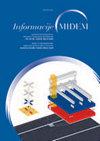数字可调差分增益级
IF 0.8
4区 工程技术
Q4 ENGINEERING, ELECTRICAL & ELECTRONIC
Informacije Midem-Journal of Microelectronics Electronic Components and Materials
Pub Date : 2019-02-01
DOI:10.33180/infmidem2018.408
引用次数: 0
摘要
大多数ASIC都需要信号调理子电路来修改各种信号参数;其中一个重要的参数是增益。本文提出的结构是基于传统的R-2R结构,其主要缺点是不匹配性。研究表明了改善失配特性的可能方法,或使我们能够在不发生失配恶化的情况下提高比特分辨率。该方法可用于进一步提高许多先前描述的方法的准确性[1],[2],这些方法已经消除了高分辨率不匹配缺陷。本文介绍了采用数字增益调整的增益级的实现,在128个等距单调步长中,范围从0.9到1.1,然而,该方法甚至可以实现更高分辨率的级。为了在制造工艺和恶劣环境下工作,设计了一个标准0.18μm CMOS技术的全差分放大器。设计了一种结合电阻网络的阻尼器,并给出了包括寄生电容在内的仿真结果。本文章由计算机程序翻译,如有差异,请以英文原文为准。
Digitally Adjustable Differential Gain Stage
Most ASIC’s demand signal conditioning sub-circuits to modify various signal parameters; one of the important parameter
is the gain. The presented configuration is based on the conventional R-2R structure which mainly suffers from the mismatch
imperfections. The study shows possible approach to improve mismatch characteristic or enables us to take the advantage to
increase bit resolution without mismatch deteriorations. The approach could be used to even further improve accuracy of the
numerous previously described approaches [1], [2] which already eliminate high resolution mismatch imperfections. Paper presents
the implementation of the gain stage with digital gain adjustment, in the range from 0.9 to 1.1 in 128 equidistant monotonous steps,
nevertheless the approach could be implemented even for higher resolution stages. For robust design in terms of the fabrication
process and harsh environment operation, a fully differential amplifier was designed in standard 0.18μm CMOS technology. Designed
amplifier in combination with resistive network is presented together with simulation results including the parasitic capacitances.
求助全文
通过发布文献求助,成功后即可免费获取论文全文。
去求助
来源期刊
CiteScore
1.80
自引率
0.00%
发文量
10
审稿时长
>12 weeks
期刊介绍:
Informacije MIDEM publishes original research papers in the fields of microelectronics, electronic components and materials. Review papers are published upon invitation only. Scientific novelty and potential interest for a wider spectrum of readers is desired. Authors are encouraged to provide as much detail as possible for others to be able to replicate their results. Therefore, there is no page limit, provided that the text is concise and comprehensive, and any data that does not fit within a classical manuscript can be added as supplementary material.
Topics of interest include:
Microelectronics,
Semiconductor devices,
Nanotechnology,
Electronic circuits and devices,
Electronic sensors and actuators,
Microelectromechanical systems (MEMS),
Medical electronics,
Bioelectronics,
Power electronics,
Embedded system electronics,
System control electronics,
Signal processing,
Microwave and millimetre-wave techniques,
Wireless and optical communications,
Antenna technology,
Optoelectronics,
Photovoltaics,
Ceramic materials for electronic devices,
Thick and thin film materials for electronic devices.

 求助内容:
求助内容: 应助结果提醒方式:
应助结果提醒方式:


